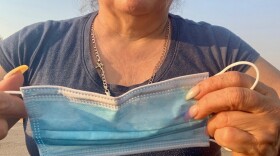Almost half a million Coloradans have received at least one dose of the COVID-19 vaccine. While that number indicates a promising start on the road to the state’s pandemic recovery, advocates say vaccine distribution has been marred by inequity.
Latino people make up 22% of the state’s population, but they have only received 5% of all vaccines. That disparity is far larger among Latino people than any other racial or ethnic group in the state.
A campaign from the office of Gov. Jared Polis is working with nonprofits across the state to help bridge that gap through a combination of targeted messaging and vaccine clinics specifically aimed at Latinos. Glenwood Springs-based nonprofit Voces Unidas de Las Montañas is carrying out that mission in the Roaring Fork Valley.
“There aren’t a lot of Latinos designing public health programs or designing strategies that governments are leading because we’re not in those seats,” said Alex Sánchez, executive director of Voces Unidas. “Oftentimes the end result is that we fall a little bit behind and we’re the last customer to actually tap some of these benefits.”

Government strategies to inform and educate about the vaccine often are not built to reach Latinos, Sánchez said. And because many of them do not have health insurance or a private doctor, health information does not always reach them.
Messaging tailored specifically for that community can reach its members in a way broader statewide campaigns cannot.
“We need to make sure we’re delivering the message in the right way, with the right messengers and speaking their language,” Sánchez said. “Not just in terms of Spanish versus English, but in terms of our culture and making sure that we are connecting with them.”
The effort to help correct the inequity also included a vaccine clinic in Glenwood Springs on Saturday, Jan. 30. The event, orchestrated with Latinos in mind, featured translators to help with medical communication.
Sánchez said staging a vaccine clinic in Glenwood Springs has ripple effects for the health of the entire Roaring Fork Valley.
“We may live in Garfield County, but we’re actually moving up and down the valley on a daily basis,” he said. “If one side of the valley has more inequities than the other, we all suffer.”
Edith Lemus, who received a vaccination at the Saturday clinic, is an example of that. She lives in Rifle and works in Aspen.
She said she felt “blessed” to be among the first to receive a vaccine that would allow her to safely visit loved ones.
“I want to see my family,” she said. “I want to hug my family. I haven’t seen my grandbaby for a whole year. To me, that’s the main reason. I want to be with my family.”
Lemus said she was worried about possible side effects of the vaccine. While she eventually decided to get the shot, skepticism abounds among her friends and peers.
“I really haven’t spoken to anyone that’s excited about it,” she said. “They all have their doubts. Yeah, it could be good. But what if? And I was in the same boat.”
That is representative of a nationwide trend of vaccine skepticism. According to a Pew Research study published in December, 63% of Hispanic adults said they would “probably/definitely” get a COVID-19 vaccine. By comparison, that number was 61% for white Americans and 42% among Black Americans.
Information campaigns across Colorado, including Spanish-language efforts, are partially aimed at increasing trust and eliminating those doubts.

Blanca Uzeta O’Leary, chair of the board for Voces Unidas, was volunteering at the recent clinic. She said the 200 vaccination appointments filled quickly, and if attendees had any doubts about the shot, they checked those at the door.
“We ask, ‘Do you have a hesitancy? Are there any questions?’ And they say, nope! They’ll tell you – I have arthritis, or I’m taking this blood pressure medicine. We talk about all of that. But outside of that, everybody is just grateful to be getting the vaccine.”
Many of those who showed up were 65 years old or older, and some mentioned that younger family members had encouraged them to seek out the vaccine. Uzeta O’Leary helped book appointments and noted that efforts to get older Latinos vaccinated have been multigenerational.
“Often it was the younger kids that could [make the appointments], because they have to get online,” she said. “It was younger kids doing it for their moms and dads and their grandmothers. Even though they’re not eligible yet, they were helping the senior members of their family.”
In addition to translators, Uzeta O’Leary cited a few more unique additions to the vaccine clinic designed to make visitors more comfortable.
“I do not know how many vaccination locations have Mexican hot chocolate and tamales,” she said.
While the event brought vaccines to 200 Coloradans, Alex Sánchez said it “not a silver bullet” when it comes to the larger issue of vaccine inequity.
“We need the ecosystem to do better,” he said. “To embed more equity into all of those systems that are actually going to do 99% of the vaccines. We are just scratching the surface. We are not a hospital, we are not a clinic.”
Requests for interviews with the state’s vaccine equity task force were not returned in time for publication.






